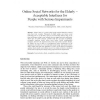Free Online Productivity Tools
i2Speak
i2Symbol
i2OCR
iTex2Img
iWeb2Print
iWeb2Shot
i2Type
iPdf2Split
iPdf2Merge
i2Bopomofo
i2Arabic
i2Style
i2Image
i2PDF
iLatex2Rtf
Sci2ools
INTENV
2010
2010
Online Social Networks for the Elderly - Acceptable Interfaces for People with Serious Impairments
Today's Web 2.0 is a place, where people express themselves, interact share their lives, socialize. Thousands of elderly people join various social networking sites or use the Net to keep in touch with their families. But, as we show in the paper, today's social software does not target their needs sufficiently. While there are usable solutions, usability itself does not imply acceptability. Acceptable interfaces should reflect user's habits, follow understandable metaphors, and above all, target their deep needs as precisely as possible. Further, the elderly can not be taken as a homogeneous group characterized by the impairments, but rather as a set of individual human beings, with specific wishes, desires, habits, and with some disabilities, of course. In the paper we formulated qualities which should social software meet to be widely perceived as beneficial and in result accepted by the elderly and by people with serious impairments. Keywords. Social networks, elderl...
| Added | 18 May 2011 |
| Updated | 18 May 2011 |
| Type | Journal |
| Year | 2010 |
| Where | INTENV |
| Authors | David Zejda |
Comments (0)

